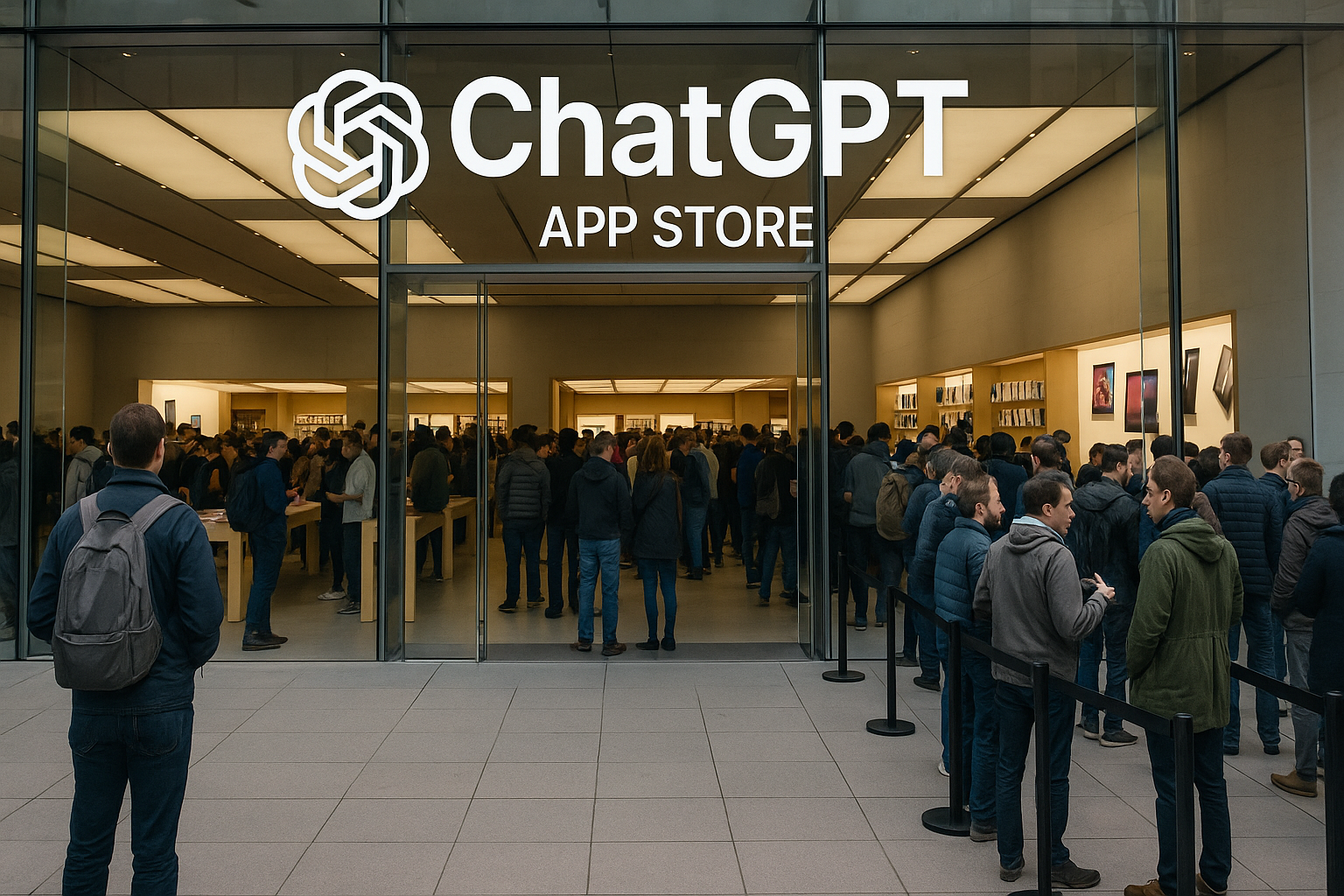The Internet Condom Is Coming

Kevin Smith
4 min read • 16 July 2025
🔗 Originally published on LinkedIn
A New Interface for the Digital Age
The internet. A vast, unfiltered expanse of information. Raw, chaotic and often perilous. But is all that about to change?
Large language models (LLMs) like OpenAI’s ChatGPT are emerging as intermediaries, filtering and presenting information in a curated manner. LLMs are becoming “a condom for the internet”; a protective barrier between us and the unfiltered web.
This is a new era where AI intermediaries sanitise, streamline and mediate our interactions with the chaotic sprawl of the digital world. While this offers safety and convenience, it also raises uncomfortable questions about authenticity, control and the future of information access.
OpenAI: The Vanguard of Digital Mediation
OpenAI’s ChatGPT is the poster child for this new paradigm. Instead of directing users to a multitude of sources, it synthesises information into concise, coherent responses.
This approach offers clear advantages:
- Safety: By filtering out harmful, misleading or toxic content, users are shielded from digital hazards.
- Efficiency: Users receive direct answers without sifting through pages of search results or spam-laden websites.
- Accessibility: Complex topics are distilled into understandable summaries, democratising access to knowledge.
But this model isn’t without consequence. It introduces the risk of over-reliance on curated content and the potential erosion of information diversity.
If the internet becomes an API for language models, the raw weirdness, creativity and fringe perspectives that have always defined it risk being smoothed into oblivion.
Google: The Search Behemoth Under Threat
Google’s core business revolves around search and advertising. Its traditional model encourages users to click through to various websites, generating billions in ad revenue. This ecosystem depends on users actively exploring the web.
Enter LLMs.
When AI provides direct, high-quality answers, the incentive to click disappears. This is not a minor disruption; this is a slow-motion car crash aimed squarely at Google’s golden goose.
When OpenAI turn on the ads and the sponsored content, and they will, that goose is cooked.
In response, Google has launched its Search Generative Experience (SGE), a bold attempt to integrate AI-generated summaries into search results. But there’s a catch. The more effective the AI is at delivering instant answers, the fewer ads get clicked. Google is left cannibalising its own business model just to remain relevant.
It’s a perfect illustration of the innovator’s dilemma. Either disrupt yourself, or someone else will.
Meta: A Strategic Pivot Superintelligence
Meta, traditionally a social media giant, isn’t sitting still either. Unlike Google, its revenue doesn’t depend on search, it depends on capturing attention inside closed ecosystems like Facebook, Instagram and WhatsApp.
But if users start spending more time interacting with AI agents, whether for discovery, planning, shopping or conversation, Meta’s attention monopoly comes under threat.
Zuckerberg’s response has been aggressive. Meta recently launched Meta Superintelligence Labs, funnelling billions into its AI ambitions. It invested $14 billion into Scale AI and appointed its CEO, Alexandr Wang, as Meta’s Chief AI Officer.
Meta’s goal? Develop AI systems that don’t just augment chat but aim for something bigger: general-purpose intelligence that can rival or surpass human capabilities.
To supercharge this effort, Meta has been poaching top talent from OpenAI with eye-watering compensation packages - some exceeding $100 million. High-profile defections include OpenAI researchers from the Zurich office, such as Lucas Beyer, Alexander Kolesnikov and Xiaohua Zhai.
This is not a a shot across the bow. This is a full-blown AI talent war.
The Talent War and the Battle for AI Supremacy
Meta’s hiring spree isn’t just a story about pay packets, eye-watering though they are, it’s a strategic move that signals where the power balance in tech is heading.
OpenAI’s leadership has expressed public concern about these defections. Chief Research Officer Mark Chen bluntly described it as, “someone breaking into our home and stealing something.”
This isn’t melodrama. It’s a reflection of the existential stakes. AI is the foundation of the next computing platform. Whoever controls the best models, the best infrastructure and the best researchers effectively controls the future.
The lines between Big Tech companies, AI labs and infrastructure providers are collapsing into a single, brutal battleground.
The Broader Impact on the Internet Ecosystem
If LLMs become the default interface for accessing knowledge, the ripple effects across the internet economy are profound:
- Content Creators Collapse: Fewer clicks mean less ad revenue for bloggers, journalists, review sites and small publishers.
- SEO Becomes Obsolete: If people no longer type search queries but simply ask an AI, the entire SEO industry withers. No more keyword stuffing, backlink farms or "top 10 VPN" clickbait.
- Affiliate Marketing Dies: AI doesn’t send users to review sites laden with affiliate links. It just recommends the best product directly.
- Information Diversity Shrinks: AI models tend to surface consensus views or statistically likely answers. Fringe, niche or dissenting content risks being buried unless specifically asked for.
- Power Centralises: Instead of the open web being a decentralised discovery tool, the AI layer becomes a gatekeeper - curating what users see, what they know, and who gets traffic.
This is an economic shockwave waiting to happen.
Google vs Meta: Different Exposures, Same War
- Google faces an existential threat. Its business model is the public internet. If the internet becomes a backend data source for LLMs, the value chain breaks. Google’s revenue engine stops spinning.
- Meta is differently exposed. Its product isn’t information retrieval but attention and connection. However, if personal AI agents replace scrolling as the primary way users interact with the digital world e.g finding products, planning events, organising lives, Meta’s attention economy starts leaking.
Both companies are racing to either own the AI layer or embed AI deeply within their existing ecosystems before someone else cuts them out.
The Direction of Travel Is Clear
The internet of today - the wild, sprawling, link-driven, ad-supported mess - is being slowly suffocated. Replaced by an AI-mediated layer that is clean, safe, efficient… and profoundly centralised.
If OpenAI (or any foundation model provider) becomes the de facto interface for the web, it essentially becomes the condom for the internet: a protective, interpretive layer between users and the raw web. One that filters, sanitises and curates.
You don’t Google. You don’t click. You just ask.
And whether that’s OpenAI’s GPT, Google’s Gemini, Meta’s Llama or Apple’s on-device personal agents, the end result is the same.
The Endgame
The internet fractures into three modes:
- Agent-first experiences: You ask an AI; it gets it done. No search, no browsing.
- Brand-first experiences: Trust in the AI doesn’t replace trust in brands. People still choose Nike, Patagonia or the BBC. But they access them via agents.
- Ambient discovery: AI models recommend things before you even ask - based on context, patterns and predictive intent.
While this sounds like hyperbole, you can see it’s already starting to play out:
- Meta is bleeding OpenAI’s top researchers.
- Google is scrambling to reinvent search while preserving its ad business.
- OpenAI has already become the default information interface for millions.
The open web as we knew it is being wrapped. Sheathed inside an AI abstraction layer. Safer, yes. More efficient, absolutely. But also more centralised, more controlled and less… real.
The internet condom is coming. Whether that’s a blessing, a curse or just an inevitability is a choice we probably don’t get to make anymore.
This article was originally written and published on LinkedIn by Kevin Smith, CTO and founder of Dootrix.

Kevin Smith

